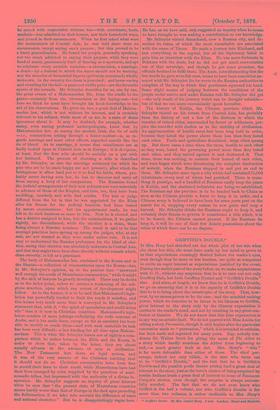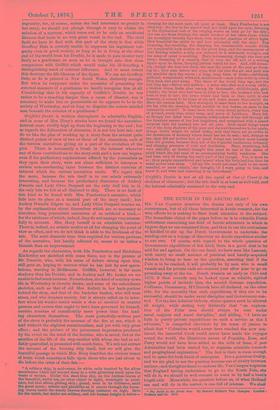GRIFFITH'S DOUBLE.*
IF Mrs. Hoey had sketched oat the whole plot of her tale when she chose her title, she must have made up her mind to prove to us that expectations cunningly flashed before the reader's eyes, even though they be more or less baseless, are quite as competent to excite an eager interest as expectations justified by the event. Daring the earlier part of the story before us, we make acquaintance with G. D., without any suspicion that he is to turn out not only Geoffrey Dale, but both Geoffrey Durant and " Griffith's Double" also. And when, at length, we know that he is Griffith's Double, we go on assuming that it is in his capacity of Griffith's Double that he is to bring about the catastrophe of the story. That, how- ever, by no means proves to be the case ; and the mischief-making power, which we conceive to be latent in his likeness to Griffith, gives interest to the story only by the illusory expectation it excites in the reader's mind, and not by resulting in any great con- fusion or disaster. We do not know that this false expectation is in any way an artistic fault. We do not quarrel with Miss Austin for calling a story Persuasion, though it only begins after the particular concession made to "persuasion," which it is int,ended to criticise, has been made and repented for many years. Nay, nobody con- demns Sir Walter Scott for giving the name of The Abbot to a story which hardly mentions the Abbot from beginning to end,—a much greater fault in Art. Mrs. Hoey's " title " is far more defensible than either of these. The chief per- sonage, indeed her only villain, is the man who turns out to be "Griffith's Double," and the fact that he is Griffith's Double and the possible perils thence arising lend a great deal of interest to the story, just as the hero's chance of being surprised by hostile Indians lends a great deal of interest to some of Fenimore Cooper's stories, even though the surprise is always success- fully avoided. The fact that we do not even know who Griffith is for half a volume, nor who Griffith's Doable is for more than two volumes, is rather creditable to Mrs. Hoey's = ariffives Double. By Mrs. Cashel Hoey. 8 vole. London : Hurst and Michela.
ingenuity, for, of course, unless she had interested us greatly in her story, we should not plough through it only to obtain the solution of a mystery, which turns out to be only an accidental likeness that leads to no very great result in the end. The chief fault we have to find with this part of the story is that while Geoffrey Dale is entirely unable to suppress his ingrained vul- garity even in good society, so long as he is living at the other end of the world from his Double, he is made to pass muster very fairly as a gentleman so soon as he is brought into that close comparison with Griffith which would make his ill-breeding a distinguishing mark of external difference. And to some extent this destroys the life-likeness of the figure. We can see Geoffrey Dale, as he is painted in New South Wales, distinctly enough.
But when he reappears under the necessity of presenting the external manners of a gentleman we hardly recognise him at all. Considering that in his capacity of Griffith's Double he was rather to be a standing danger than a cause of disaster, was it necessary to make him so presentable as he appears to be in the society of Wrottesley, and so long to disguise the coarse-minded man beneath the exterior of a gentleman ?
Griffith's Double is written throughout in admirable English, and in none of Mrs. Hoey's stories have we found the narrative- interest more vividly kept up from the beginning to the end ; but as regards the delineation of character, it is not her best tale ; nor do we like the plan of working up a story from the several quite distinct points of view of two or three of the characters, each of the various narratives giving us a part of the evolution of the plot. There is necessarily a break in the interest wherever one of these contributions to the story ends and a new one begins, even if the preliminary explanations offered by the journalists as they open their story, were not alone sufficient to interpose a certain non-conducting layer between the distinct currents of interest which the various narratives excite. We regret this the more, because the tale itself is to our minds extremely interesting, and because the preliminary discourses of Audrey Dwarris and Lady Olive Despard are the only dual bits in it, the only bits we felt at all disposed to skip. There is no fault of this kind to be found with Mrs. Pemberton's narrative, which falls into its place as a natural part of the story itself ; but Audrey Dwarris fidgets us, and Lady Olive Despard wearies us,
by the explanations about themselves which are so necessary to introduce long journalistic narratives of so artificial a kind,—
for the existence of which, indeed, they do not manage very success- fully to account. Mrs. Hoey herself is an admirable narrator. There is, indeed, no artistic motive at all for changing the point of view so often, and we do not think it adds to the liveliness of the tale. The semi-dramatic tone thus required for various portions of the narrative, but hardly adhered to, seems to us rather a blemish than an improvement As regards the characters, both Ida Pemberton and Madeleine Kindersley are sketched with some force, nor is the picture of Mr. Dwarris, who, with his sense of failure strong upon him, still goes on, hoping to recover what he has lost by new specu- lations, wanting in lifelikeness. Griffith, however, is far more shadowy than his Double, and in Audrey and Mr. Lester we are unableto feel muchinterest. Nevertheless, the kind of country-town life in Wrottesley is cleverly drawn, and some of the subordinate sketches, such as that of old Mrs. Kellett in her back-parlour behind the shop, and that of the bachelor banker, who will wear shoes, and who despises society, but is always called on to inter- fere when his weaker senior wants a dens ex machind to control persons and events that ought to have been governed by himself, contain touches of considerably more power than the lead- ing characters themselves. The most powerfully-written part of the story is probably the account of the fire at sea, which is told without the slightest sensationalism, and yet with very great effect ; and the picture of the permanent impression produced by the event on the mind of the heroine, who is saved, but at the sacrifice of the life of the step-mother with whom she had so sel- fishly quarrelled, is presented with much force. We will not extract the account of the burning ship itself, but we will give the beautiful passage in which Mrs. Hoey describes the curious trance of brain which sometimes falls upon those who are just about to die before the crisis of their fate :—
" A solitary ship, in mid-ocean, its white sails touched by the silver moonbeams which fall beyond them in a wide glittering track upon the waste of waters. Under the steel-blue sky, on the restless bosom of the beautiful, awful sea, no other object in sight, seemingly in exist- ence, but that silent, gliding ship ; grand, even in its littleness, amid the great space ; solemn and ghostlike as it moves through the boom- ing waves under the steady heaven-flooding radiance on high. Save for the watch, her decks are solitary, and her human freight is below— sleeping for the most part, all quiet at least. Mary Pemberton is not sleeping; she lies in her narrow bed, hor child upon her arm, listening to the rhythmical rush of the surging waves as they go by the ship ; she can see them through the small window of her state-room, where the moonlight daintily tips them with myriad sparkles of silver light. How beautiful the night is, and how unusually still the ship The straining, the creaking, the flapping, the innumerable sounds which are inseparable from motion on the great deep, and the management of that floating wonder, a ship, are reduced to a minimum to-night, and the sense of quiet is soothing. Mary is dreaming, though she does not sleep ; dreaming of a country that is very far off, and of a waiting figure upon its shore, keeping patient watch for her. And, still dream- ing, though she does not sleep, she sees the years of the past go troop- ing by ; they pass before her eyes, float out into the air, and melt into the sparkles upon the waves ; a long, long train of them—childhood, girlhood, womanhood, wifehood, motherhood—such is the order in which they pass, and pass away. The faces of the loved long ago, and the lost long ago—father and mother ; a sister who died se a young child; a brother whom India slew among its thousands; child-friends, girl- friends ; the lover who had been so false to her; the husband who had been so true to her; the home which had been so dear, until, in one moment, it ceased to be home at all, and home meant thenceforth for Mary the unseen land. How strangely it came back to her to-night, as she lay with the sleeping infant nestled in her bosom, an atom in the immensity around! It came back with every detail perfect, every foot of ground, every tree, every room, and piece of furniture. Mary felt as though her mind were roaming independent of her will through all the forsaken scenes of her lost happiness, and recognised with a placid surprise that the journey was not all pain. Such small things came out of the deep shadows of the past and showed themselves to her again, things which might be called trifles, only that there are no trifles in the storehouse of memory where death has set its seal; and, strange to say, they did not torture her, as small things can torture more keenly than the greater, because they tell of the frightful continuous intimacy and clinging presence of rain and desolation. Mary, wondering, but very placidly, at herself, thought this must be one of the states of mind which she had read of as accompanying bodily weakness. She had been very ill daring the early part of the voyage. Yes, it must be so ; thus people remembered and mused when the body had less than its usual power over them. 'All my life could not come back to me more uncalled, or more calmly,' she thought, 'if I were going to him, and knew it, and were just summing it up beforehand.'"
Greffith's Double is not at all the equal of Out of Court in its sketches of character ; but the tale itself is at least as well told, and the interest admirably sustained to the very end.



































 Previous page
Previous page